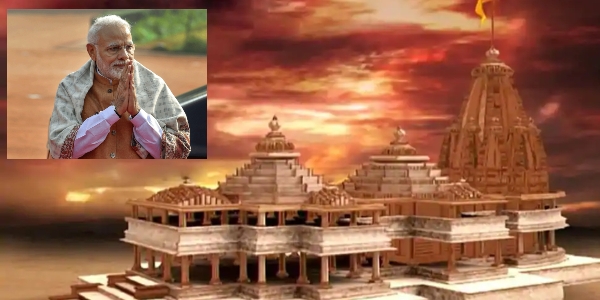NaMo, the 'Prime Minister' should'nt have attended 'Bhoomi Pujan'!
Total Views |
According to the formal invitation card that has been issued by the organisers, Narendra Modi, prime minister of India, is set to take part in the August 5 ‘Bhoomi pujan’ marking the beginning of construction work for a Ram temple in Ayodhya, at the site where the Babri Masjid once stood. The temple owes its existence to a historic yet unsigned written judgment by the Supreme Court last November, when it granted the entire 2.77 acres of disputed land in Ayodhya to the Hindu litigants. In the very same judgment, for balancing equities, the court directed the Central and Uttar Pradesh governments to allot an alternative five acres of land to the Muslim party to build a mosque.
However, under the Indian constitutional principle of secularism, can a prime minister attend this religious function? This takes us back to the first few years of the republic, when, on the eve of the inauguration of the newly built Somnath temple, India’s first prime minister, Jawaharlal Nehru, had certain disagreements with the first president, Rajendra Prasad, regarding Prasad’s acceptance of an invitation to inaugurate the Somnath temple.

In a letter to Prasad, Nehru wrote: “I confess that I do not like the idea of your associating yourself with a spectacular opening of the Somnath Temple. This is not merely visiting a temple, which can certainly be done by you or anyone else but rather participating in a significant function which unfortunately has a number of implications.” By the 'number of implications', Nehru presumably meant that the inauguration of a temple by the president would be a challenge to the secular fabric of the Indian republic. Prasad ignored Nehru’s advice and said, 'I would do the same with a mosque or a church if I were invited.'
Secularism, in the Indian context, doesn’t just encapsulate the idea of the state being secular. It’s a rainbow platform where various colours of our religions co-exist harmoniously. We are allowed to be what we are or what we want. That also gives every citizen (including the prime minister) the right to practice her or his own religion and have their own personal faith. But while there is nothing wrong with Modi the citizen attending the foundation stone-laying ceremony for the Ram Mandir, the same act may not be completely right for a prime minister.
As noted, the invitation cards refer to Modi’s official designation, and unless he makes an unequivocal declaration that he is attending the event in his individual capacity, his visit will be treated as an official one. Secondly, there is no clarity about the costs or expenses associated with his participation in the event. The prime minister, who is primus inter pares in India’s system, in a way represents the collective conscience of the country. He may be a Hindu, he may have campaigned for Hindu votes, but after being voted to power he must represent citizens of all faiths equally. He is in the North, but with the responsibility to work for the South as well. He hails from Western India, but has a duty to take care of people in Eastern India. He has to meet the high standards of secular credentials attached with the office of the prime minister.
The prime minister is duty bound, constitutionally, to maintain the trust of all communities. In his personal capacity, this may be an event that marks the fulfilment of election promises made by the BJP (building the Ram Mandir), but in his official capacity, the message that is being conveyed by him attending the event is not in consonance with his oath under the constitution. In that oath, he affirmed to bear true faith and allegiance to the Constitution of India as by law established and to uphold the sovereignty and integrity of India.
Attending the bhoomi poojan in his official capacity will not set a healthy precedent and will undermine the cherished principle of secularism, which is part of the basic structure of India’s constitution. In the case of state-religion dichotomy, secularism is like judicial review, which ensures that all actions of the state are in conformity with the fundamental values enshrined in the constitution. Secularism merely demands that the prime minister attend this event in his individual capacity, and not as a constitutional functionary.

